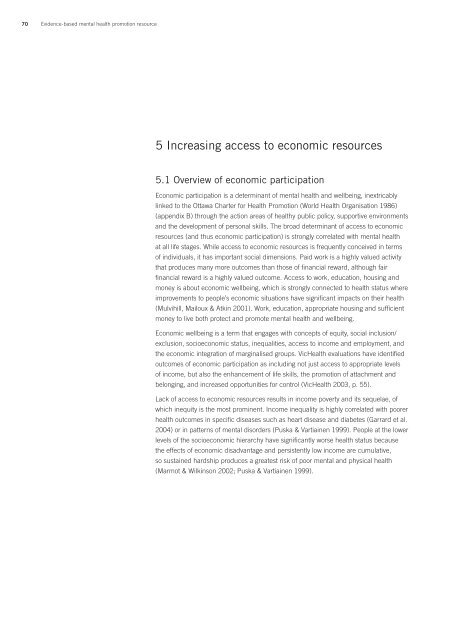Evidence-based mental health promotion resource - health.vic.gov.au
Evidence-based mental health promotion resource - health.vic.gov.au
Evidence-based mental health promotion resource - health.vic.gov.au
Create successful ePaper yourself
Turn your PDF publications into a flip-book with our unique Google optimized e-Paper software.
70 <strong>Evidence</strong>-<strong>based</strong> <strong>mental</strong> <strong>health</strong> <strong>promotion</strong> <strong>resource</strong>5 Increasing access to economic <strong>resource</strong>s5.1 Overview of economic participationEconomic participation is a determinant of <strong>mental</strong> <strong>health</strong> and wellbeing, inextricablylinked to the Ottawa Charter for Health Promotion (World Health Organisation 1986)(appendix B) through the action areas of <strong>health</strong>y public policy, supportive environmentsand the development of personal skills. The broad determinant of access to economic<strong>resource</strong>s (and thus economic participation) is strongly correlated with <strong>mental</strong> <strong>health</strong>at all life stages. While access to economic <strong>resource</strong>s is frequently conceived in termsof individuals, it has important social dimensions. Paid work is a highly valued activitythat produces many more outcomes than those of financial reward, although fairfinancial reward is a highly valued outcome. Access to work, education, housing andmoney is about economic wellbeing, which is strongly connected to <strong>health</strong> status whereimprovements to people’s economic situations have significant impacts on their <strong>health</strong>(Mulvihill, Mailoux & Atkin 2001). Work, education, appropriate housing and sufficientmoney to live both protect and promote <strong>mental</strong> <strong>health</strong> and wellbeing.Economic wellbeing is a term that engages with concepts of equity, social inclusion/exclusion, socioeconomic status, inequalities, access to income and employment, andthe economic integration of marginalised groups. VicHealth evaluations have identifiedoutcomes of economic participation as including not just access to appropriate levelsof income, but also the enhancement of life skills, the <strong>promotion</strong> of attachment andbelonging, and increased opportunities for control (VicHealth 2003, p. 55).Lack of access to economic <strong>resource</strong>s results in income poverty and its sequelae, ofwhich inequity is the most prominent. Income inequality is highly correlated with poorer<strong>health</strong> outcomes in specific diseases such as heart disease and diabetes (Garrard et al.2004) or in patterns of <strong>mental</strong> disorders (Puska & Vartiainen 1999). People at the lowerlevels of the socioeconomic hierarchy have significantly worse <strong>health</strong> status bec<strong>au</strong>sethe effects of economic disadvantage and persistently low income are cumulative,so sustained hardship produces a greatest risk of poor <strong>mental</strong> and physical <strong>health</strong>(Marmot & Wilkinson 2002; Puska & Vartiainen 1999).



